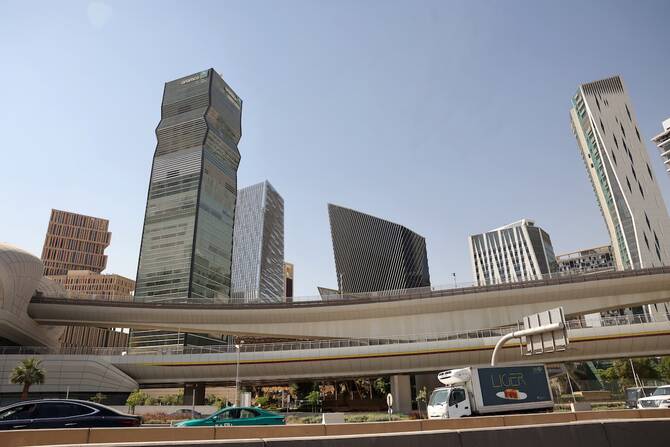SYDNEY: Australia has foiled an Islamist-inspired “terrorist plot” to bring down an airplane with an improvised explosive, authorities said Sunday, after four people were arrested in raids across Sydney.
Prime Minister Malcolm Turnbull said the plot appeared to be “elaborate” rather than planned by a lone wolf, as security was beefed up at major domestic and international airports across the nation.
“I can report last night that there has been a major joint counter-terrorism operation to disrupt a terrorist plot to bring down an airplane,” Turnbull told reporters.
“The threat of terrorism is very real. The disruption operation, the efforts overnight have been very effective but there’s more work to do.”
Officials did not specify if the alleged plot involved a domestic or international flight, but Sydney’s Daily Telegraph reported that a local route had been the objective.
Australian Federal Police Commissioner Andrew Colvin described the plot as “Islamic-inspired,” saying four men had been arrested in a series of raids across Sydney on Saturday.
“We do believe it is Islamic-inspired terrorism. Exactly what is behind this is something we need to investigate fully,” he said.
Colvin added that local authorities had received “credible information from partner agencies” about the claims but would not elaborate further or state if the men were on any watch list.
“In recent days, law enforcement has become aware of information that suggested some people in Sydney were planning to commit a terrorist attack using an IED (improvised explosive device),” he told reporters.
He added that several items “of great interest to police” had been seized in the raids but police did not yet have a great deal of information on the specific attack, the location, date or time. He said the investigation was expected to be “very long and protracted.”
“However, we’re investigating information indicating the aviation industry was potentially a target of that attack.”
Colvin would not provide further details, but the Australian Broadcasting Corporation said police found items that could be used to make a homemade bomb in one of the raided homes Saturday.
Authorities believed they planned to smuggle the device onto a plane to blow it up, the ABC added.
Four men were arrested Saturday after armed police stormed homes in at least four neighborhoods, though their names and ages have not been released and they have not been charged by police.
The Seven Network reported 40 riot squad officers moved on a terraced house in the inner city suburb of Surry Hills, as TV footage showed a man with a bandage on his head being led away by authorities, draped in a blanket.
Sections of surrounding roads remained cordoned off on Sunday as forensic officers and investigators wrapped up and removed items from the house.
Airline passengers have meanwhile been asked to arrive at least two hours early for domestic flights and three hours for international routes, and to limit their baggage.
“Australia has very strong safeguards in place at its airports; these changes are about making them even stronger,” Australian carrier Qantas said.
Airline Virgin Australia stressed that the additional airport security measures were just “precautionary” and passengers “should not be concerned.”
Turnbull said the national terror alert level, which was raised on September 2014 amid rising concerns over attacks by individuals inspired by organizations such as Daesh, would remain at probable.
Canberra has introduced new national security laws since then, while counter-terrorism police have also made a string of arrests.
A total of 12 attacks, before the latest announcement, have been prevented in the past few years, while 70 people have been charged, Justice Minister Michael Keenan said.
“The primary threat to Australia still remains lone actors, but there’s still the ability for people to have sophisticated plots and sophisticated attacks still remain a real threat,” he told reporters Sunday.
The prime minister added that the alleged plan appeared to be “more in that category of an elaborate plot.”
Several terror attacks have taken place in Australia in recent years, including a Sydney cafe siege in 2014 that saw two hostages killed.
Australia foils ‘terror plot’ to bring down airplane
Australia foils ‘terror plot’ to bring down airplane

Beyond government: how digital defense is becoming a priority across Saudi Arabia

RIYADH: Saudi Arabia’s cybersecurity market is entering a decisive growth phase, driven by rapid digital transformation, expanding cloud and artificial intelligence adoption, and increasingly robust regulatory frameworks.
Sustained public and private investment under Vision 2030 is expected to propel the sector into one of the fastest-growing and most structurally advanced cybersecurity markets in the region.
According to Dimension Market Research, the Kingdom’s cybersecurity market size is expected to reach $11.3 billion by the end of 2033 at a compound annual growth rate of 14.2 percent.
Projected size of the cybersecurity market in Saudi Arabia
In recent years Saudi Arabia has experienced consistent and strategic growth in cybersecurity investments, largely fueled by the rapid adoption of digital services across organizations.
Samer Omar, cybersecurity and digital trust leader at PwC Middle East, said there was around SR15.2 billion ($4.05 billion) of investment in the sector in Saudi Arabia in 2024, and if current trends continue, most market assessments suggest the industry could reach between $7 billion and $9 billion by 2030.
“What matters most is how organizations are maturing. As more services move to the cloud and AI becomes embedded in day-to-day operations, security is increasingly part of early decision-making rather than an afterthought,” Omar told Arab News.

He added: “I expect the market to continue growing as organizations strengthen governance, modernize legacy systems, and invest in more advanced monitoring and response capabilities.”
This market expansion is not just reactive or trend-driven — Saudi Arabia’s cybersecurity growth is structurally anchored in Vision 2030’s digital-first agenda, mandatory regulatory frameworks, and the sheer scale of state-led investments in digital and infrastructure projects.
According to Maximilian Chowanetz, partner at Kearney Middle East, and his colleague San Jain, principal in the firm’s digital and analytics practice in Dubai, the market is currently valued at approximately SR17 billion, is projected to more than double to around SR35 billion by 2030, reflecting annual growth of over 15 percent.
“Unlike many emerging markets where cybersecurity adoption remains uneven, Saudi Arabia combines giga-projects, nationally deployed digital platforms, and expanding cloud infrastructure with increasingly stringent compliance requirements across sectors. This creates sustained, non-discretionary demand for advanced cyber capabilities, particularly in critical infrastructure protection, cloud security, and operational technology/information technology convergence,” Chowanetz and Jain said in a joint statement.
They added: “As digital services become embedded across the economy, cybersecurity is evolving from a supporting IT function into a core enabler of national resilience and economic competitiveness. These fundamentals position Saudi Arabia as one of the fastest-growing and most structurally advanced cybersecurity markets in the region.”
Investment beyond finance, government
Cybersecurity is increasingly emerging as a key priority across various rapidly evolving sectors.
In Saudi Arabia, cybersecurity investment is growing not only in finance and government but also across sectors such as healthcare, energy, and the broader digital economy, where fast-paced digitization is surpassing conventional security frameworks. These industries lie at the crossroads of national priorities, operational risks, and major technology rollouts under Vision 2030.
From PwC’s lens, Omar shed light on how in the energy and industrial sectors the integration of connected technologies is on the rise, heightening the demand for robust protection of operational systems. Similarly, healthcare providers are broadening their digital health offerings, making security and privacy essential components of daily clinical practices.
“Telecoms, cloud providers, and data centers are also strengthening their capabilities as they support the Kingdom’s growing digital infrastructure. Retail, e-commerce, and education are evolving quickly as well, each with their own requirements as they introduce new digital platforms and services,” he said.
The official added: “What ties these sectors together is the recognition that secure digital services are essential to future growth. As the Kingdom continues progressing toward Vision 2030, cybersecurity is becoming a core enabler for sectors that are modernizing at pace.”

From Kearney’s perspective, Chowanetz and Jain also highlighted how healthcare is digitizing at speed, with electronic health records, telemedicine platforms, and connected medical devices expanding the attack surface and making data protection and patient safety critical imperatives.
“In energy and critical infrastructure, the integration of smart grids, renewables, and industrial IoT is driving demand for advanced OT and industrial control systems security frameworks, an area where Saudi Arabia’s scale positions it as a global reference point. Alongside this, the rapid expansion of the digital economy, underpinned by cloud adoption and connected ecosystems, is elevating the need to secure data, networks, and edge devices,” they said.
The two spokespeople added: “Together, these sectors represent where cybersecurity is no longer discretionary, but foundational to service continuity, public trust, and economic resilience.”
Opportunities for local, global players
As with many other sectors in Saudi Arabia, cybersecurity presents a wealth of opportunities for both local and international players to tap into.
Omar from PwC highlighted that a major focus is growing cybersecurity talent, with rising demand pushing many organizations to rely on managed services and expert support.
He underlined that small and medium-sized businesses also present key opportunities, seeking affordable, user-friendly security solutions, ideally with Arabic-language support, to match their needs.
“As cloud adoption increases, there is rising demand for cloud security, identity management, and secure development practices. Industrial environments also need tailored support as they integrate older systems with modern technologies,” Omar said.
He added: “We’re also seeing interest in practical guidance related to the Personal Data Protection Law, along with locally relevant threat intelligence and training. These needs create space for both local and global providers to offer solutions that help organizations move forward with confidence as the digital economy continues to grow.”
From their side, Chowanetz and Jain shed light on how the Kingdom’s cybersecurity market holds major opportunities, with key gaps in capability, scale, and specialization — especially as demand expands beyond the public sector.
They went on to note that talent shortages are driving demand for managed services, automation, and upskilling to maintain resilience. Meanwhile, SMEs remain underserved, facing rising regulatory pressures but lacking affordable cybersecurity solutions — creating strong demand for scalable, compliance-ready offerings.

“Sector-specific solutions remain underdeveloped, particularly in areas such as health care device security, OT and ICS protection, cloud sovereignty, and IoT segmentation. Addressing these gaps will be critical not only to strengthening national cyber resilience but also to attracting investment, accelerating localization, and supporting sustainable growth across Saudi Arabia’s digital economy,” Chowanetz and Jain said.
Awareness increasing for individuals, SMEs
As digital services expand under Vision 2030, cybersecurity in Saudi Arabia is becoming a personal priority, with risks now extending to homes, devices, and daily transactions. At the same time, people are becoming more aware of protecting their personal data and managing their digital lives more securely.
From PwC’s side, Omar indicated that clearer data protection laws and educational initiatives have improved public awareness of cybersecurity, especially among younger audiences.
“Over time, this gradual change plays an important role in building long-term digital confidence and supporting the Kingdom’s wider digital ambitions,” he said.
On Kearney’s behalf, Chowanetz and Jain clarified that with national platforms like Absher and Tawakkalna and the rise of fintech and smart cities, cybersecurity in Saudi Arabia now directly affects individuals, expanding risks beyond organizations to personal data and daily life.
“As consumer awareness rises, driven by both local experience and global breaches, trust is becoming the critical currency of Saudi Arabia’s digital ecosystem. This shift is accelerating demand for user-centric security solutions, stronger data protection frameworks, and shared accountability between institutions and citizens to ensure confidence, resilience, and long-term digital adoption,” they said.











